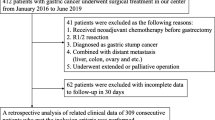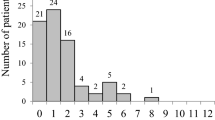Abstract
Background
The relationship between nutritional risk and postoperative recovery of patients with major laparoscopic abdominal surgery is still unclear. The present study was designed to assess the value of the nutritional risk screening in predicting the postoperative outcomes in this cohort of patients.
Methods
Data from a consecutive series of 75 patients undergoing various elective major laparoscopic abdominal operations was prospectively collected. Nutritional risk was defined by the Nutritional Risk Screening 2002 (NRS 2002) score and correlated to the incidence of postoperative complications and hospital stay. Multivariate regression identified factors associated with 30-day complications [odds ratio (95 % confidence interval)].
Results
The overall incidence of nutritional risk was 34.7 %. There was a significantly higher infectious complication rate of 38.5 % in patients at nutritional risk, compared to 12.2 % in patients at no risk (p = 0.008). No significant difference of postoperative hospital stay and overall complications was found in patients at nutritional risk or not. Nutritional risk was identified as an independent predictor of postoperative infectious complications (odds ratio 4.87 [1.33–17.84]; p = 0.017).
Conclusions
The present study reinforces the value of the NRS 2002 to identify patients at higher risk of infectious complications after major laparoscopic abdominal surgery. In the era of minimally invasive surgery, the problem of nutritional risk still deserves our attention and concern.
Similar content being viewed by others
References
Jie B, Jiang ZM, Nolan MT, Zhu SN, Yu K, Kondrup J (2012) Impact of preoperative nutritional support on clinical outcome in abdominal surgical patients at nutritional risk. Nutrition 28:1022–1027
Sungurtekin H, Sungurtekin U, Balci C, Zencir M, Erdem E (2004) The influence of nutritional status on complications after major intraabdominal surgery. J Am Coll Nutr 23:227–232
Sorensen J, Kondrup J, Prokopowicz J, Schiesser M, Krähenbühl L, Meier R, Liberda M, Euro OOPS Study Group (2008) EuroOOPS: an international, multicentre study to implement nutritional risk screening and evaluate clinical outcome. Clin Nutr 27:340–349
Bozzetti F, Gavazzi C, Miceli R, Rossi N, Mariani L, Cozzaglio L, Bonfanti G, Piacenza S (2000) Perioperative total parenteral nutrition in malnourished, gastrointestinal cancer patients: a randomized, clinical trial. JPEN J Parenter Enteral Nutr 24:7–14
Beattie AH, Prach AT, Baxter JP, Pennington CR (2000) A randomised controlled trial evaluating the use of enteral nutritional supplements postoperatively in malnourished surgical patients. Gut 46:813–818
Correia MI, Waitzberg DL (2003) The impact of malnutrition on morbidity, mortality, length of hospital stay and costs evaluated through a multivariate model analysis. Clin Nutr 22:235–239
Kim HH, Hyung WJ, Cho GS, Kim MC, Han SU, Kim W, Ryu SW, Lee HJ, Song KY (2010) Morbidity and mortality of laparoscopic gastrectomy versus open gastrectomy for gastric cancer: an interim report–a phase III multicenter, prospective, randomized trial (KLASS Trial). Ann Surg 251:417–420
Venkat R, Edil BH, Schulick RD, Lidor AO, Makary MA, Wolfgang CL (2012) Laparoscopic distal pancreatectomy is associated with significantly less overall morbidity compared to the open technique: a systematic review and meta-analysis. Ann Surg 255:1048–1059
Kondrup J, Allison SP, Elia M, Vellas B, Plauth M, Educational and Clinical Practice Committee, European Society of Parenteral and Enteral Nutrition (ESPEN) (2003) ESPEN guidelines for nutrition screening 2002. Clin Nutr 22:415–421
Kondrup J, Rasmussen HH, Hamberg O, Stanga Z (2003) Nutritional risk screening (NRS 2002): a new method based on an analysis of controlled clinical trials. Clin Nutr 22:321–336
Dindo D, Demartines N, Clavien PA (2004) Classification of surgical complications: a new proposal with evaluation in a cohort of 6336 patients and results of a survey. Ann Surg 240:205–213
Pacelli F, Bossola M, Papa S, Malerba M, Modesti C, Sgadari A, Bellantone R, Doglietto GB, Modesti C, EN-TPN Study Group (2001) Enteral vs parenteral nutrition after major abdominal surgery: an even match. Arch Surg 136:933–936
Waitzberg DL, Caiaffa WT, Correia MI (2001) Hospital malnutrition: the Brazilian national survey (IBRANUTRI): a study of 4000 patients. Nutrition 17:573–580
McWhirter JP, Pennington CR (1994) Incidence and recognition of malnutrition in hospital. BMJ 308:945–948
Martins CP, Correia JR, do Amaral TF (2005) Undernutrition risk screening and length of stay of hospitalized elderly. J Nutr Elder 25:5–21
Bozzetti F (2009) Screening the nutritional status in oncology: a preliminary report on 1,000 outpatients. Support Care Cancer 17:279–284
Ryu SW, Kim IH (2010) Comparison of different nutritional assessments in detecting malnutrition among gastric cancer patients. World J Gastroenterol 16:3310–3317
Siribumrungwong B, Srithamma B, Kuntonpreeda K, Tomtitchong P, Paochareun V (2011) Prevalence of malnutrition and nutritional assessment in abdominal-surgical patients; a prospective cross-sectional study. J Med Assoc Thai 94(Suppl 7):S19–S23
Schiesser M, Muller S, Kirchhoff P, Breitenstein S, Schäfer M, Clavien PA (2008) Assessment of a novel screening score for nutritional risk in predicting complications in gastro-intestinal surgery. Clin Nutr 27:565–570
Schnelldorfer T, Adams DB (2005) The effect of malnutrition on morbidity after surgery for chronic pancreatitis. Am Surg 71:466–472
dos Santos Junqueira JC, Cotrim Soares E, Rodrigues Correa Filho H, Fenalti Hoehr N, Oliveira Magro D, Ueno M (2003) Nutritional risk factors for postoperative complications in Brazilian elderly patients undergoing major elective surgery. Nutrition 19:321–326
Kau AL, Ahern PP, Griffin NW, Goodman AL, Gordon JI (2011) Human nutrition, the gut microbiome and the immune system. Nature 474:327–336
Chandra RK (1997) Nutrition and the immune system: an introduction. Am J Clin Nutr 66:460S–463S
Fan ST, Lo CM, Lai EC, Chu KM, Liu CL, Wong J (1994) Perioperative nutritional support in patients undergoing hepatectomy for hepatocellular carcinoma. N Engl J Med 331:1547–1552
Braga M, Gianotti L, Nespoli L, Radaelli G, Di Carlo V (2002) Nutritional approach in malnourished surgical patients: a prospective randomized study. Arch Surg 137:174–180
Disclosures
Drs. Wei Zhou, Xiaowu Xu, Jiafei Yan, and Yiping Mou have no conflicts of interest or financial ties to disclose.
Author information
Authors and Affiliations
Corresponding author
Rights and permissions
About this article
Cite this article
Zhou, W., Xu, X., Yan, J. et al. Nutritional risk is still a clinical predictor of postoperative outcomes in laparoscopic abdominal surgery. Surg Endosc 27, 2569–2574 (2013). https://doi.org/10.1007/s00464-013-2790-1
Received:
Accepted:
Published:
Issue Date:
DOI: https://doi.org/10.1007/s00464-013-2790-1




